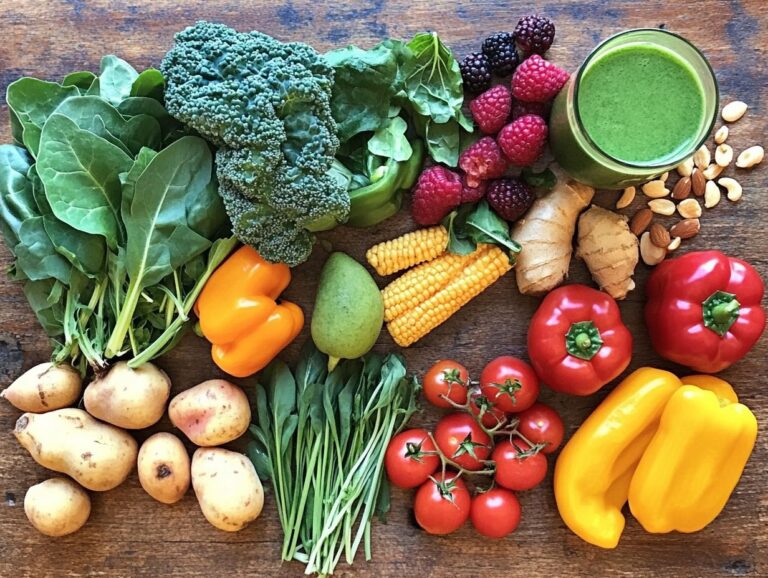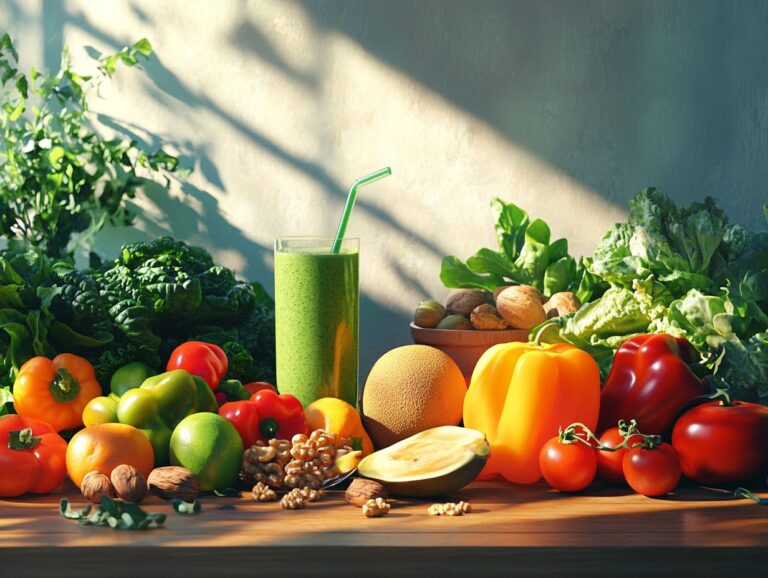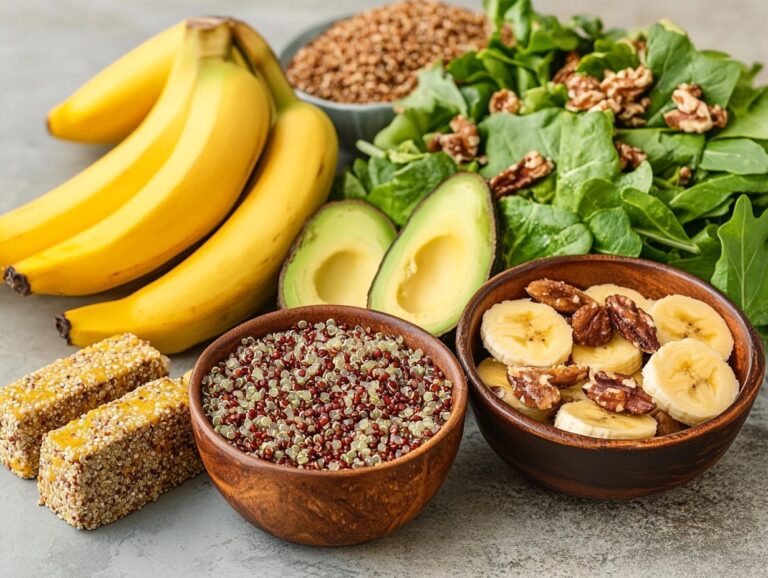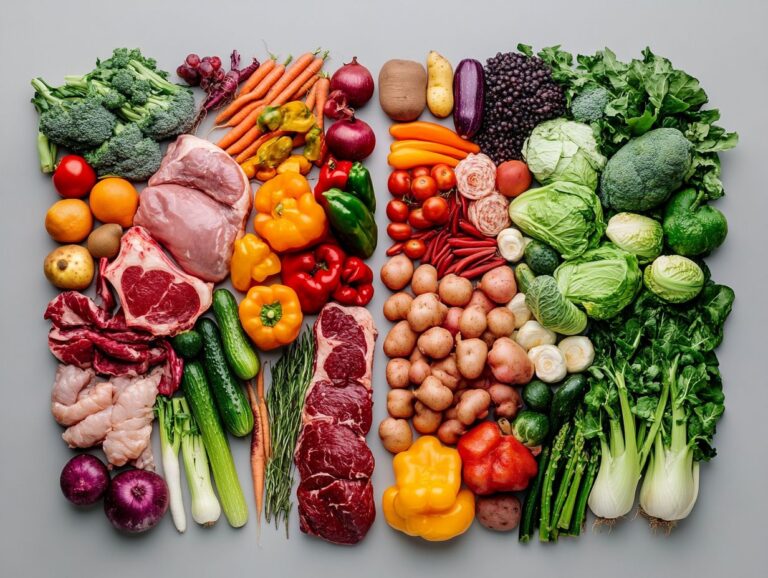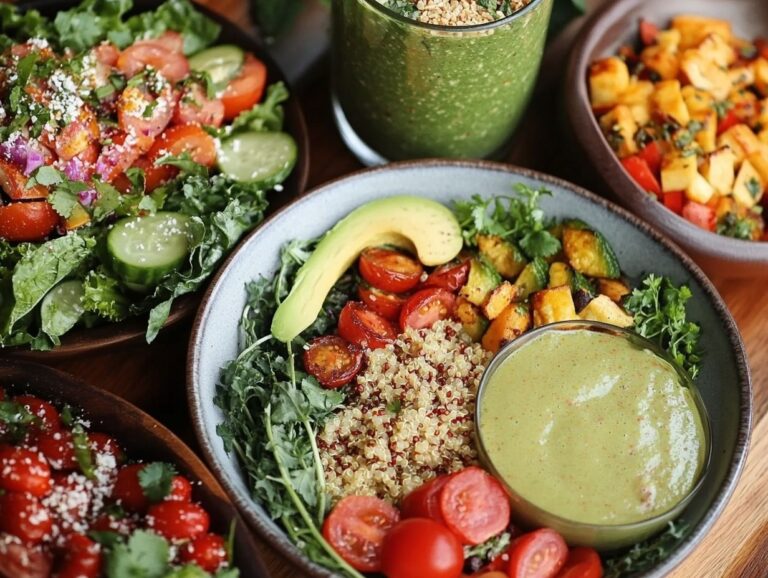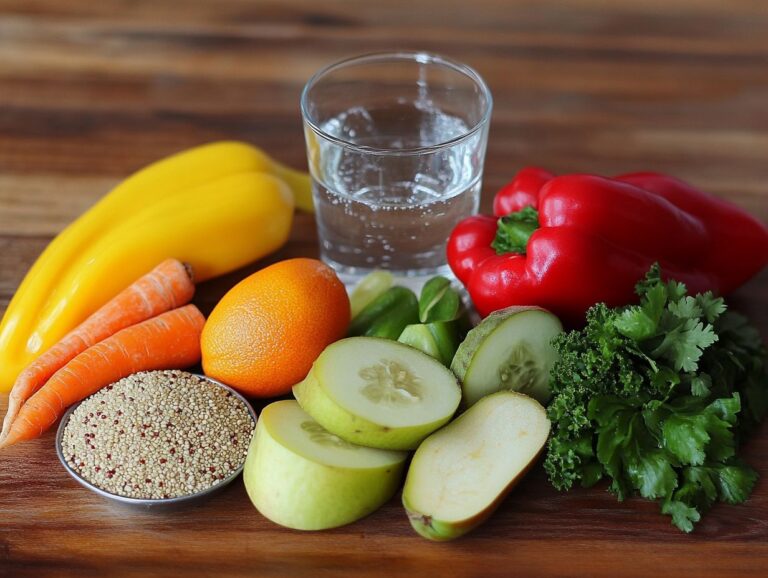This article provides an overview of what a vegan diet entails, highlighting its health benefits and discussing the inclusion of vegan bread. It details which ingredients may render bread non-vegan, offers guidance on how to identify and find vegan-friendly options, and lists popular bread brands that are trustworthy. Additionally, the article includes instructions for making delicious vegan bread at home for those who want to experiment with different types of bread.
Key Takeaways:
- Always check the ingredients list and look for vegan certification when buying bread on a vegan diet. Understanding bread labels is crucial for identifying non-vegan ingredients.
- Avoid non-vegan bread ingredients such as milk, honey, and eggs, as well as other food additives like casein and whey.
- Some vegan-friendly bread brands include Dave’s Killer Bread, Ezekiel Bread, Silver Hills Bakery, and Food for Life. These brands ensure their products do not contain non-vegan ingredients.
What is a Vegan Diet?
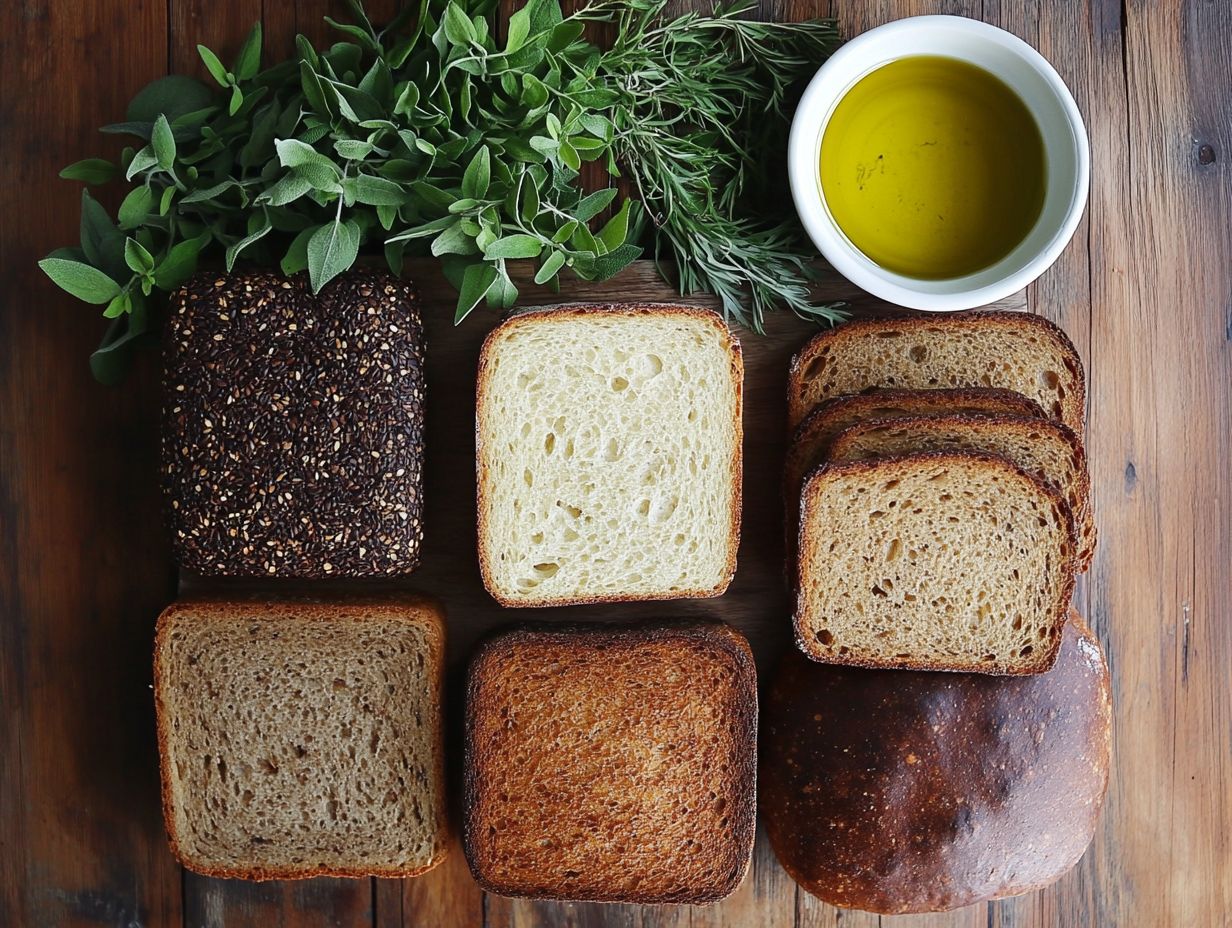 A vegan diet is a plant-based lifestyle that excludes all animal products, including meat, dairy, eggs, and honey, and is motivated by ethical, environmental, and health considerations. This diet not only focuses on avoiding animal-derived foods but also emphasizes the consumption of whole grains, fruits, vegetables, legumes, nuts, and seeds, providing a rich variety of nutrients. As part of a vegan lifestyle, individuals often seek alternatives to common non-vegan ingredients, which fosters a deeper understanding of food labels and dietary guidelines aimed at promoting sustainable eating.
A vegan diet is a plant-based lifestyle that excludes all animal products, including meat, dairy, eggs, and honey, and is motivated by ethical, environmental, and health considerations. This diet not only focuses on avoiding animal-derived foods but also emphasizes the consumption of whole grains, fruits, vegetables, legumes, nuts, and seeds, providing a rich variety of nutrients. As part of a vegan lifestyle, individuals often seek alternatives to common non-vegan ingredients, which fosters a deeper understanding of food labels and dietary guidelines aimed at promoting sustainable eating.
What Are the Benefits of a Vegan Diet?
The benefits of a vegan diet extend beyond personal health to include environmental and ethical considerations, which is attracting more people to this lifestyle choice today. Research has demonstrated that vegan diets are linked to various health improvements, such as lower risks of chronic diseases, better weight management, and enhanced nutritional adequacy due to the increased consumption of fruits, vegetables, whole grains, and legumes. By opting for a plant-based diet, individuals can enhance their health while simultaneously benefiting the environment.
Is Bread Vegan?
Understanding whether bread is vegan involves knowing the typical ingredients used in bread production and recognizing non-vegan ingredients. Not all bread is vegan, as many varieties may contain non-vegan ingredients that are not immediately apparent. Common types of bread, such as sourdough, ciabatta, and bagels, sometimes include dairy, eggs, or honey, which do not align with a vegan diet. Additionally, commercially produced breads may contain dough conditioners or leavening agents derived from animal sources. Therefore, individuals following a vegan lifestyle should carefully examine bread labels and understand the ingredients and processes involved in bread-making to ensure their dietary needs are met.
What Ingredients Make Bread Non-Vegan?
Certain ingredients in bread can make it non-vegan, and consumers should be aware of these components when selecting baked goods.
- Casein and Whey: These are milk proteins sometimes added to bread, particularly in enriched or specialty brands, to enhance the protein content and achieve a softer texture. They are common in commercially produced breads.
- Eggs: Eggs are a common ingredient in many breads, prized for their binding properties and ability to add richness, especially in artisanal loaves.
- Additives: Other non-vegan food additives may include L-cysteine, which is derived from animal hair or feathers. This ingredient is often used in packaged bread to expedite the manufacturing process.
- Leavening Agents: Some leavening agents, such as gelatin and certain dough conditioners sourced from animals, can complicate the search for truly vegan bread options. Baking powder and baking soda are typically vegan, but it is always good to check the ingredient sources.
- Leavening Agents: Some leavening agents, such as gelatin and certain dough conditioners sourced from animals, can complicate the search for truly vegan bread options.
By being mindful of these ingredients, consumers can make more informed choices when selecting their baked goods.
What to Look for in Vegan-Friendly Breads?
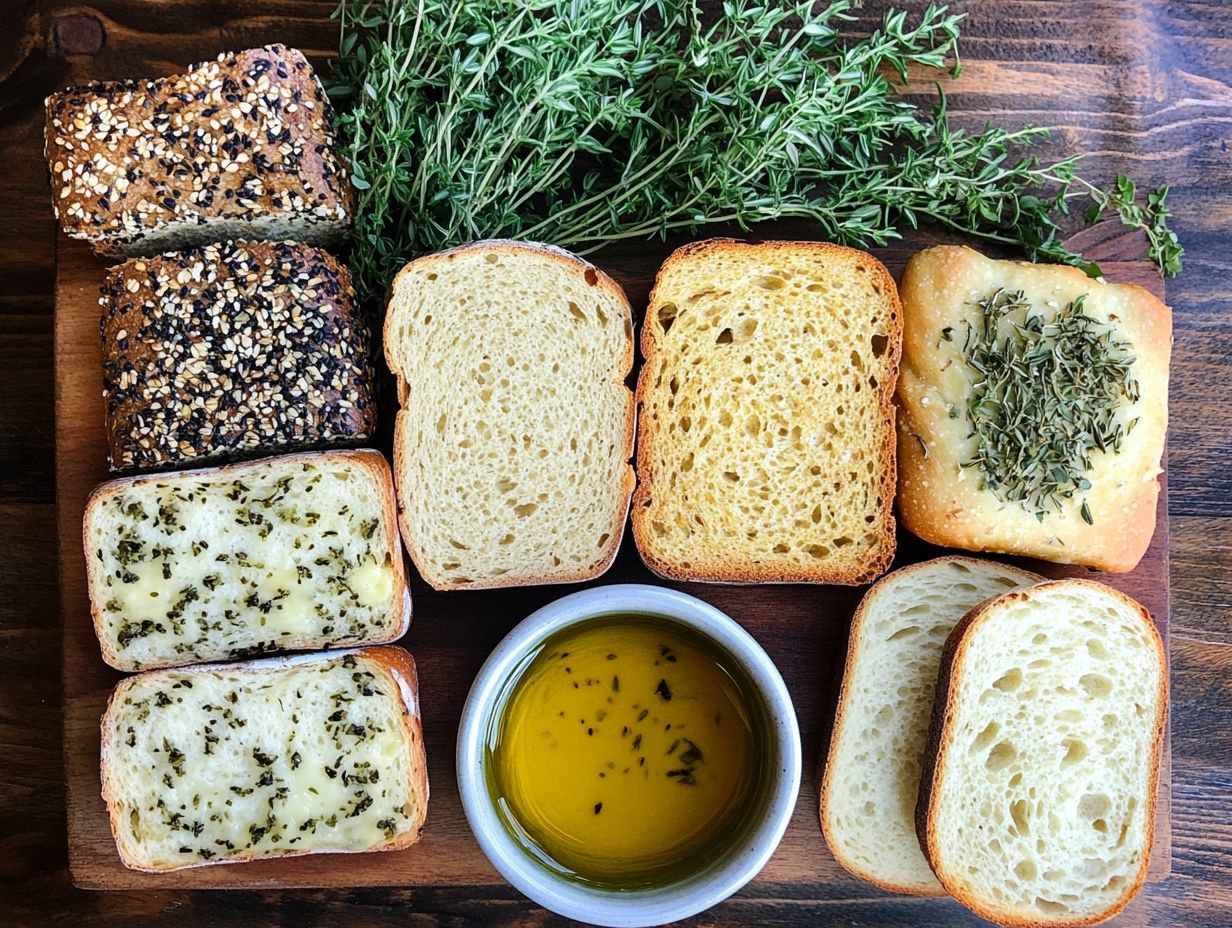 When choosing vegan bread, consumers should be aware of the following ingredients and certifications to seek out or avoid. Ingredient checking is crucial to ensure the bread meets vegan standards. First, look for breads that are explicitly labeled as vegan. Additionally, be cautious of breads that contain common non-vegan ingredients, especially in processed foods. Opt for breads that use healthy alternatives to refined grains. It’s also important to understand the bread-making process and to be familiar with the different types of bread available, such as whole grain and sprouted grain options.
When choosing vegan bread, consumers should be aware of the following ingredients and certifications to seek out or avoid. Ingredient checking is crucial to ensure the bread meets vegan standards. First, look for breads that are explicitly labeled as vegan. Additionally, be cautious of breads that contain common non-vegan ingredients, especially in processed foods. Opt for breads that use healthy alternatives to refined grains. It’s also important to understand the bread-making process and to be familiar with the different types of bread available, such as whole grain and sprouted grain options.
1. Check the Ingredients List
The most important step in determining whether a particular bread is vegan is to carefully read its ingredients label. This practice helps identify ingredients that are suitable for vegans, as well as uncover non-vegan components that could be harmful, such as dairy, eggs, or honey, which may appear under different names. Understanding how to read bread labels is crucial for consumers following a plant-based diet, as it enables them to make choices that align with their health and ethical beliefs, and avoid non-vegan ingredients. It is essential to look for terms like casein, gelatin, or whey, which may indicate the presence of animal-derived substances. Additionally, many bread varieties may contain enriched flour with vitamin D3, often sourced from sheep’s wool, or added sugars that have been processed with bone char. Flour water and yeast are fundamental components, but it’s vital to check for hidden non-vegan additives. Learning about common non-vegan additives and their various names is a good idea. Searching for brands that clearly label their breads as vegan can simplify the selection process and reduce the chances of inadvertently choosing a non-vegan option.
2. Look for Vegan Certification
Many of the top vegan bread brands offer products that are certified vegan, providing consumers with a straightforward way to ensure that a bread product aligns with a vegan lifestyle. These certifications help ensure that the bread-making process does not involve any non-vegan ingredients. Numerous reputable brands have certified vegan options, simplifying the decision-making process for shoppers. Since these brands do not include non-vegan ingredients, certification allows consumers to choose from a variety of bread products that support their lifestyle choices without needing to examine the ingredient list for each purchase. Notable brands include:
- Ezekiel
- Dave’s Killer Bread
- Oroweat
The significance of vegan certification goes beyond mere assurance; it promotes transparency and accountability within the food industry. For those dedicated to a vegan lifestyle, the availability of certified options means they can enjoy traditional staples such as whole grain breads or sourdough boules, all while ensuring their choices align with their ethical beliefs. This commitment from brands ultimately encourages sustainable and health-focused practices.
3. Avoid Certain Types of Bread
Certain types of bread are more likely to contain non-vegan ingredients, so consumers must be cautious when selecting their bread options. While some artisan loaves and flatbreads can occasionally be vegan, more common varieties, such as bagels or breads enriched with dairy or eggs, should be avoided or checked carefully to ensure they meet vegan dietary restrictions. Understanding which types of bread to steer clear of enables consumers to make better choices that align with their vegan diets. Many commercial loaf breads often contain milk powder, butter, or honey, transforming even the simplest slice into a non-vegan option. For instance, fluffy brioche is known for its rich buttery flavor and texture because it is made with eggs and milk, making it a staple in non-vegan diets. Similarly, some pita breads and sandwich breads may contain whey or calcium stearate derived from animal sources. Common breads like these should be scrutinized to ensure they adhere to vegan dietary laws. Therefore, consumers need to read ingredient labels closely to identify these potential non-vegan additives and ensure that every product they choose aligns with the values of a vegan lifestyle, including the environmental impact of their choices.
What Are Some Vegan-Friendly Bread Brands?
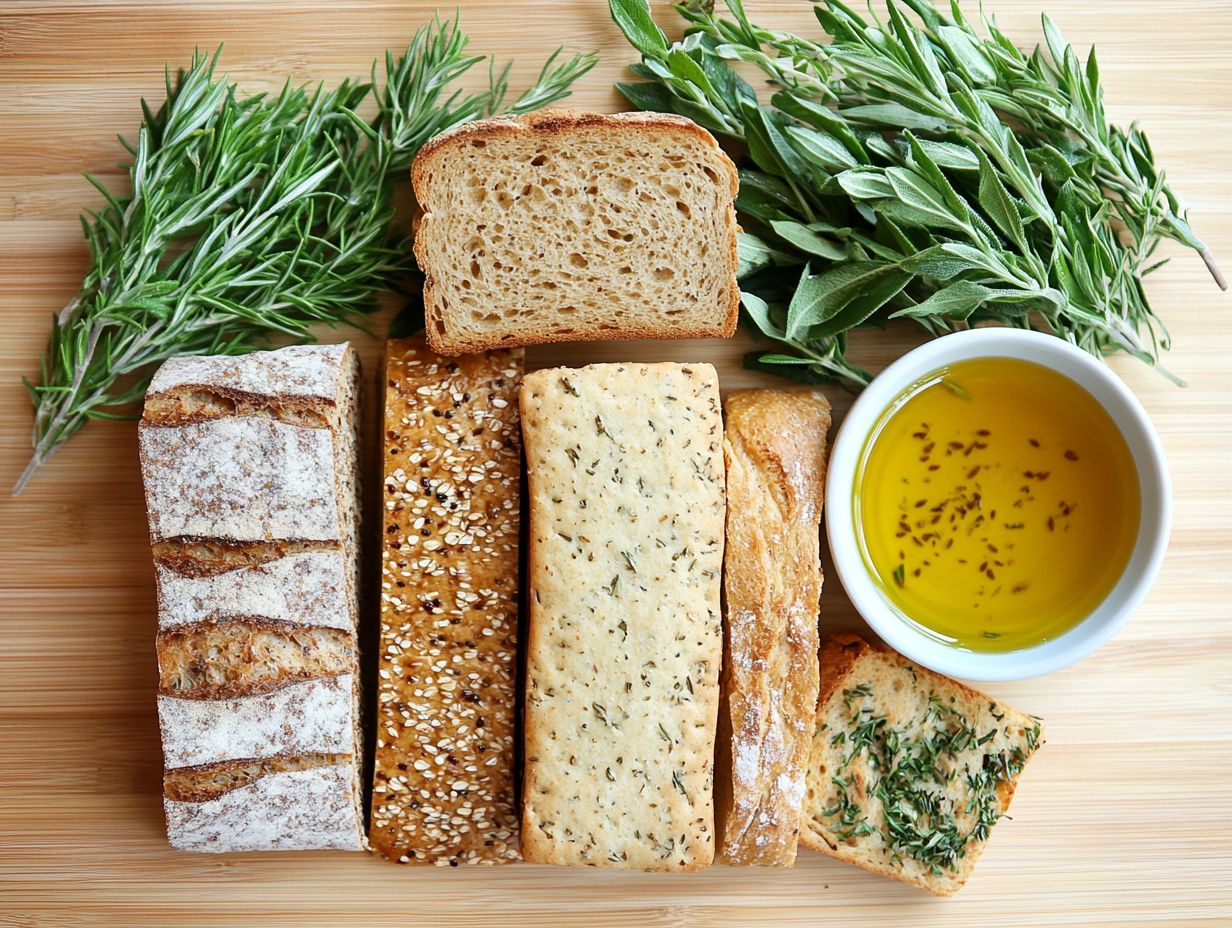 Here are some brands that are well-known for producing vegan bread products, catering to the growing demand for plant-based diets:
Here are some brands that are well-known for producing vegan bread products, catering to the growing demand for plant-based diets:
- Dave’s Killer Bread
- Ezekiel Bread
- Silver Hills Bakery
- Food for Life
These brands have established themselves as leaders in the market by committing to vegan ingredients and providing transparent labeling. They focus on whole grains, plant oils, and dairy-free products, which support sustainable eating and healthy alternatives. By choosing products from these brands, consumers can enjoy high-quality, delicious breads while supporting their vegan lifestyle and avoiding non-vegan ingredients.
1. Dave’s Killer Bread
Dave’s Killer Bread is a brand recognized for its high-quality vegan breads made from whole grain ingredients that cater to health-conscious consumers. Their artisan loaves come in a variety of flavors and textures, appealing to a wide consumer base. The bread-making process emphasizes using high-quality, vegan-friendly ingredients like sprouted grains and whole grain flour. The wholesome ingredients used ensure that their breads offer nutritional benefits without compromising on taste. The brand is particularly known for its use of organic grains and seeds, which not only supports sustainable farming practices but also enhances the overall nutritional profile of their breads. Additionally, their products contain no artificial preservatives or fillers, a crucial factor for health-conscious shoppers. With a unique brand identity that resonates with plant-based eaters, Dave’s Killer Bread allows consumers to enjoy delicious, hearty breads free from animal products. Each loaf undergoes nutritional analysis to ensure it meets the dietary needs of health-conscious individuals. Each bite reflects a dedication to quality and a commitment to healthier living.
2. Ezekiel Bread
Ezekiel Bread is one of the most nutritious options available in the vegan-friendly category, primarily due to its core ingredient: sprouted grains. It is rich in protein and fiber, making it an excellent choice for anyone seeking healthy bread alternatives. The fermentation process used in preparing Ezekiel Bread enhances the digestibility of the food, which is particularly beneficial for those who consume only plant-based products. This process also supports the inclusion of yeast, a common leavening agent in vegan bread production. This unique bread incorporates a variety of ingredients, including wheat, barley, beans, lentils, and millet, providing a wide range of essential nutrients. Additionally, it serves as a complete protein source, which is especially advantageous for individuals looking for healthy protein options. The inclusion of a variety of grains also makes it a great source of dietary fiber. The use of sprouted grains in Ezekiel Bread can also enhance nutrient absorption, leading to improved health benefits. It is important to note that commercially produced Ezekiel Bread is made without any non-vegan ingredients, ensuring it aligns with a vegan lifestyle. Ezekiel Bread has a rich flavor and a slightly chewy texture, making it a versatile choice for a variety of spreads and toppings. This makes it an ideal option for breakfast or lunch. This type of bread, along with other common breads like sourdough and baguette, offers significant health benefits due to their whole grain content. Furthermore, it has a low glycemic index, which helps maintain stable energy levels and is a great choice for those concerned about healthy blood sugar levels. Additionally, it is a part of the various artisan loaves that are preferred by individuals following a plant-based diet for sustainable eating and nutritional analysis.
3. Silver Hills Bakery
Silver Hills Bakery is a leading provider of vegan breads, offering high-quality, whole grain products for health-conscious consumers. Their bread production includes a variety of bread types, such as flatbreads and bagels, all adhering to vegan dietary laws. Their bread products focus on consciously sourced ingredients, emphasizing plant-based options that enable individuals to make ethical dietary choices. This focus on ingredient checking ensures that all products avoid casein, whey, and other non-vegan ingredients, aligning with the principles of Veganism. Each product is crafted using only vegan ingredients that are nutritionally rich, ranging from their signature Sprouted Whole Grain bread to their flavorful Vegan Multigrain offerings. Their commitment to vegan-friendly breads includes careful selection of leavening agents and plant oils to ensure the highest quality. Innovative baking techniques are employed to preserve the organic nature of the grains while enhancing flavor, resulting in products that are both satisfying and healthy. These techniques include the use of natural leavening agents and dough conditioners to maintain the integrity of the bread. This approach aligns with a growing community that values quality, sustainability, and a compassionate philosophy in food production. By adhering to principles of sustainable eating, Silver Hills Bakery supports the broader movement towards environmentally friendly and health-conscious food choices.
4. Food for Life
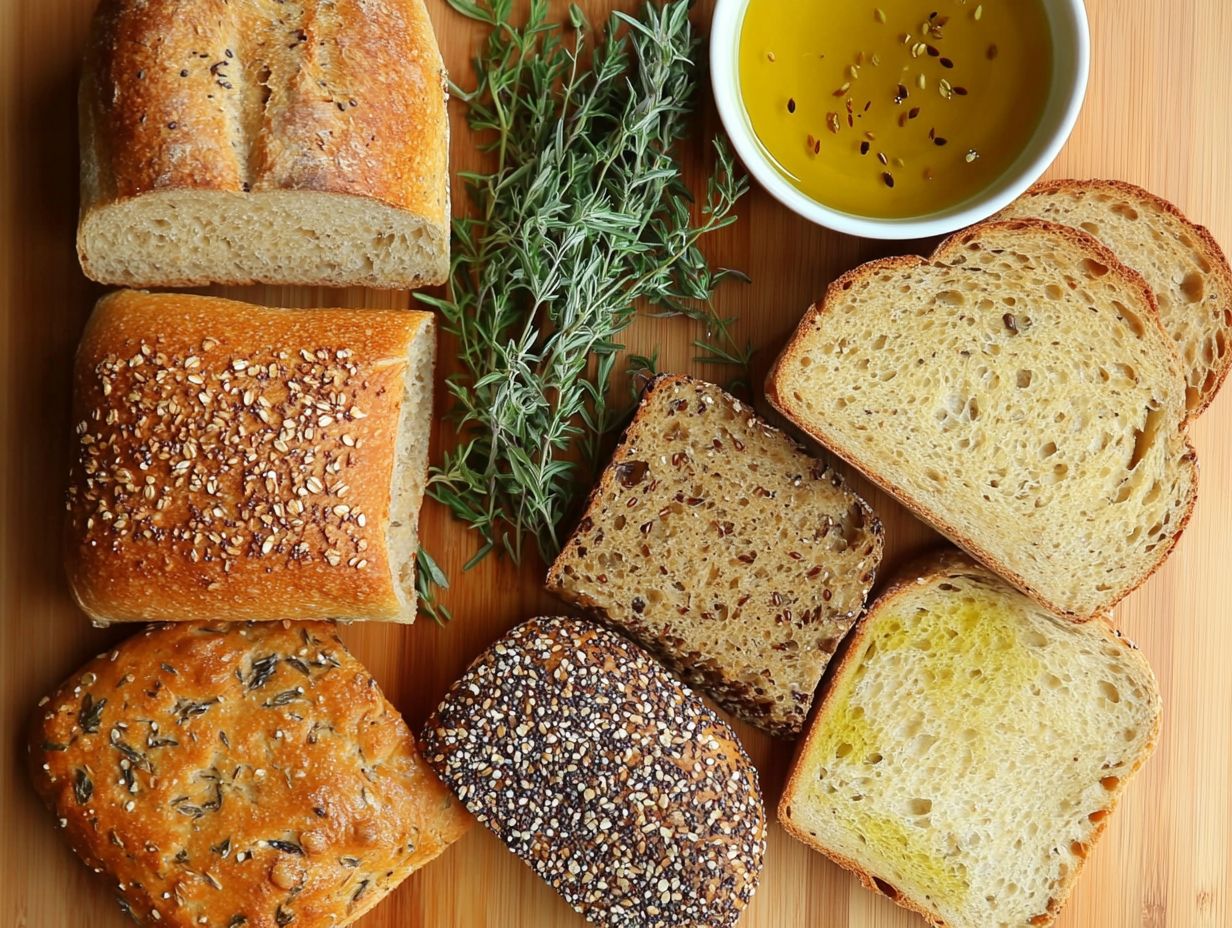 Food for Life is recognized for its artisanal approach to crafting vegan-friendly breads, utilizing sprouted grains to enhance both nutrition and flavor. By using whole, organic ingredients, all Food for Life products align with the principles of a plant-based diet. Their bread labels clearly indicate the absence of non-vegan ingredients, such as casein and whey, ensuring transparency for consumers. The brand prioritizes quality and taste, catering to consumers who seek healthy options without compromising their dietary preferences. Plus their main line of breads, Food for Life offers a diverse range of baked goods, including bagels and tortillas, all made with the same level of care. Each item is crafted from carefully sourced ingredients, such as non-GMO grains and seeds, ensuring they are both delicious and nutritionally dense. Furthermore, Food for Life emphasizes sustainability, implementing environmentally friendly production processes while providing products that contain no animal ingredients. This commitment resonates with health-conscious consumers looking for flavorful, plant-based options that seamlessly fit into their daily routines. By offering products that adhere to vegan dietary restrictions, Food for Life helps promote a diverse range of healthy alternatives within the vegan lifestyle.
Food for Life is recognized for its artisanal approach to crafting vegan-friendly breads, utilizing sprouted grains to enhance both nutrition and flavor. By using whole, organic ingredients, all Food for Life products align with the principles of a plant-based diet. Their bread labels clearly indicate the absence of non-vegan ingredients, such as casein and whey, ensuring transparency for consumers. The brand prioritizes quality and taste, catering to consumers who seek healthy options without compromising their dietary preferences. Plus their main line of breads, Food for Life offers a diverse range of baked goods, including bagels and tortillas, all made with the same level of care. Each item is crafted from carefully sourced ingredients, such as non-GMO grains and seeds, ensuring they are both delicious and nutritionally dense. Furthermore, Food for Life emphasizes sustainability, implementing environmentally friendly production processes while providing products that contain no animal ingredients. This commitment resonates with health-conscious consumers looking for flavorful, plant-based options that seamlessly fit into their daily routines. By offering products that adhere to vegan dietary restrictions, Food for Life helps promote a diverse range of healthy alternatives within the vegan lifestyle.
How to Make Vegan Bread at Home?
Vegan bread can be easily made at home using the same basic ingredients found in non-vegan bread recipes. This gives individuals following a vegan diet complete control over the ingredients they use, allowing for experimentation with healthy recipes. By avoiding processed foods and choosing natural leavening agents, home bakers can create delicious and nutritious vegan bread. To make vegan bread at home, one can use:
- Flour
- Water
- Plant-based milk
- Baking powder
- Baking soda
Additionally, natural leavening agents such as yeast or baking soda can be incorporated into homemade bread without violating vegan dietary restrictions. These agents help create artisan loaves with great texture and flavor, suitable for various dietary preferences.
1. Use Plant-Based Milk
Plant-based milk serves as an excellent dairy substitute in vegan bread recipes, providing a similar level of moisture and flavor without the inclusion of animal products. Common varieties such as almond, soy, oat, and coconut milk offer unique flavors and nutritional benefits, enhancing the versatility of a vegan diet and adding variety to baking for culinary exploration. Using plant-based milk in bread recipes ensures the final product is dairy-free, aligning with vegan dietary laws. According to the King Arthur Baking Company, each type of milk possesses distinct characteristics that can influence the final product’s texture and flavor profile. Bakers are encouraged to explore different types of flour, such as whole grain or gluten-free options, to further enhance their bread-making process. For instance, almond milk is lighter and tends to yield a more delicate crumb in baked goods, while coconut milk, with its high fat content, results in a rich, moist, and dense product. Soy milk, which is high in protein, contributes a heftier texture, whereas oat milk offers a hint of sweetness due to its naturally mild flavor.
2. Substitute Eggs with Flax or Chia Seeds
Flax seeds and chia seeds are excellent substitutes for eggs in vegan bread recipes, providing both binding and moisture. When mixed with water, these seeds form a gel-like consistency that mimics the properties of eggs, making them ideal for a variety of baked goods. By incorporating these vegan ingredients, bakers can maintain compliance with a plant-based diet while still achieving satisfying results.
- To effectively replace a single egg, it is recommended to mix one tablespoon of ground flaxseed or chia seeds with three tablespoons of water.
- Allow this mixture to sit for about 5-10 minutes until it thickens. This method ensures that baked treats, ranging from muffins to pancakes, retain their structure and texture.
It is also worth noting that flax seeds impart a nuttier flavor, while chia seeds have a relatively neutral taste, allowing them to blend seamlessly into most recipes. Experimenting with these natural substitutes not only enhances the nutritional profile of baked goods but also contributes to a diverse range of flavor experiences.
3. Try Different Types of Flour
Experimenting with different types of flour can enhance both the quality and nutrition of vegan bread. Whole grain flours, such as whole wheat, spelt, and even gluten-free options, offer distinct flavors and textures while increasing the fiber content of the bread. By choosing suitable vegan ingredients, bakers can create bread that fits within the guidelines of Veganism and appeals to a broad range of dietary preferences. By selecting suitable vegan ingredients for the flour base, bakers can create a diverse range of loaves with varying tastes and nutritional profiles. Plus whole grain flours, nut and seed flours, such as almond and flaxseed, can significantly boost the bread’s nutritional value by adding healthy fats and protein. These flours also help maintain moisture and bind the ingredients together, which is particularly important in vegan baking, where the absence of eggs can result in a crumbly dough. Furthermore, alternative flours like coconut or chickpea can introduce new flavors and contribute a variety of essential vitamins and minerals.
